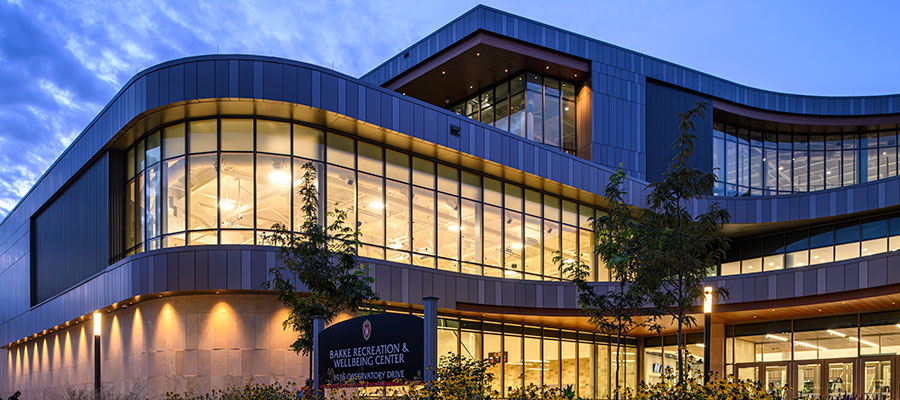The gleaming new Bakke Recreation & Wellbeing Center is a marvel on the UW–Madison campus. Opened to much fanfare and glowing reviews in April, the expansive, modern facilities feature a 25-yard recreational swimming pool, 8 multipurpose courts, an ice rink, a climbing and bouldering wall, sports simulators, multipurpose studios, a rooftop fitness area, a teaching kitchen, meditation spaces, and 29,000 square feet of fitness space.

But what the thousands of daily visitors to Bakke don’t see is the state-of-the-art networking infrastructure powering this innovative facility. From wireless speakers piping in music to esports gaming rooms to spin-class TVs tracking rider metrics, it takes an enormous amount of computing and networking capacity to keep the center’s visitors connected and its services running smoothly.
Building and maintaining that critical network infrastructure is essential yet often unheralded work made possible by a close partnership between UW’s Facilities Planning & Management, University Recreation & Wellbeing and the Division of Information Technology (DoIT). Before construction began, DoIT’s Network Services team planned a complex set of racks, cable and fiber, switches, Wi-Fi access points and backup power modules across the center’s sprawling footprint to ensure widespread, fast and continuously available connectivity.
“We provide the wired and wireless infrastructure that brings these amenities to life,” said Patrick Christian, director of Network Services. “We know that healthy students have better outcomes on all levels of academic achievement, and we’re proud to do our part to support the university’s academic mission and healthy, successful Badgers from behind the scenes.”
Next-gen capabilities
The modern fitness and wellness enthusiast doesn’t just need the best equipment while they’re working out. They also need to be able to track their progress in real-time on their personal devices, access engaging interactive programming, and stream their favorite media to keep them focused and motivated. And they need to stay connected with their peers while doing all that.
And that doesn’t even account for some of the center’s more innovative offerings. Bakke features next-gen amenities like the Wolf Teaching Kitchen, where wired networking infrastructure enables cooking demonstrations using camera feeds and displays. The Skybox Suite Sports Simulators allow golf lovers to stay on top of their game through Wisconsin’s long winters. And the Madison Esports Club room provides high-throughput, low-latency connectivity for gamers.

The building’s networking infrastructure also helps streamline operations for the staff who keep Bakke running. All the cardio fitness equipment is networked, allowing Bakke staff to track usage patterns and know when to rotate equipment so they wear out evenly over time. The network powers the audio and video systems in Bakke’s 200-person classroom and multi-use studios for group fitness classes, sport club practices, workshops and meetings. It enables notifications if any components in Bakke’s pool mechanical systems need attention. Even the colored lighting in wellness spaces like the Cadence, Halo and Tempo studios are networked to help create the appropriate ambiance.
All of these compelling new amenities require a network that is secure, fast and available throughout the vast facility. But perhaps above even those needs, the network also needed to be reliable. So Network Services also installed uninterrupted power supplies in Bakke to ensure that service would stay up even if the facility lost power.
Staying connected in their home away from home
Network Services also updated the infrastructure for the renovated Sellery and Witte residence halls. After nearly 60 years of occupancy by 2,300 students per year, expanded connectivity was a key piece of the university’s modernizing plan for the residence halls.

The Network Services team expanded Wi-Fi and added wall jacks to keep pace with students’ burgeoning device usage. Every room in the refreshed residence halls now features a “Hospitality Access Point,” which provides strong and secure wireless and wired connectivity in close quarters for the ever-growing list of students’ connected devices — from laptops to phones to smart TVs and gaming consoles.
Lounges and common areas also gained enhanced Wi-Fi to support students studying or relaxing with online entertainment. Network access points in the updated student lounges make working groups and study sessions more comfortable.
“Today’s students expect robust, seamless network access wherever they are, whether working out at the Bakke, studying in their residence hall, or anywhere on campus,” Christian said. “We try to stay one step ahead on capacity and coverage to power the modern amenities that keep UW–Madison one of the top universities in the world.”
So, while the breathtaking atrium, shiny new fitness equipment and modern dorm aesthetics catch the eye, the enhanced connectivity running silently underneath brings those experiences to life.
